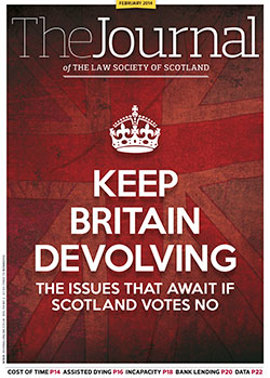Scottish Solicitors' Discipline Tribunal
Steven Angus Anderson
A complaint was made by the Council of the Law Society of Scotland against Steven Angus Anderson, solicitor, formerly of Andersons Solicitors and Notaries, Springburn, Glasgow. The Tribunal found the respondent guilty of professional misconduct in respect of his failures to respond to correspondence from other solicitors, to implement a mandate, to respond to correspondence from the Society, or to obtemper statutory notices, and his obtaining or attempting to obtain payment from the Scottish Legal Aid Board by persistent breaches of the Legal Aid Regulations, Code of Conduct and relative guidance. The Tribunal ordered that the name of the respondent be struck off the Roll of Solicitors in Scotland.
After three and a half days of evidence, the respondent tendered admissions to a number of the averments in the complaint. These disclosed that he failed on a number of occasions to respond to correspondence and statutory notices from his professional body. He had also failed to respond to correspondence and a mandate from a colleague where the client concerned was effectively remanded in custody. The respondent’s contraventions of the Legal Aid Regulations, Code of Conduct and relative guidance involved a long running, systematic abuse of the legal aid fund, including inappropriate multiple grants of advice and assistance, charging or attempting to charge for work not actually or necessarily done, holding unnecessary meetings with clients to inflate fees, acting unprofessionally, granting advice and assistance where legal aid was already in existence, and submitting double accounts. The Tribunal held that the respondent’s conduct fell well below the standard to be expected of a competent and reputable solicitor and was serious and reprehensible. Accordingly, it found the respondent guilty of professional misconduct.
A number of factors caused the Tribunal particular concern: that the respondent’s course of conduct had persisted for seven years, and comprised systematic abuse of the legal aid fund; that his misconduct was directed towards a fellow solicitor, his professional body and a public fund; and that some elements of his breaches of the regulations etc disclosed a degree of dishonesty. As a result the Tribunal concluded that the respondent was not a fit person to be a solicitor and ordered that his name should be struck from the Roll of Solicitors in Scotland.
Elizabeth Anne Dingwall
A complaint was made by the Council of the Law Society of Scotland, on behalf of a secondary complainer, against Elizabeth Anne Dingwall, solicitor, Hughes Dowdall, Glasgow. The Tribunal found the respondent guilty of professional misconduct between 22 September and 19 November 2011, in respect that, while acting under a continuing welfare power of attorney, she on 16 occasions made cash withdrawals totalling £8,350 from two bank accounts held on behalf of her client using automated telling machines and at a branch office; repeatedly failed to make and keep contemporaneous records of the transactions in the firm’s accounting records; failed to credit the cash withdrawals fully and promptly in the firm’s client account; and only made four cash deposits in the client account, leaving a shortfall that she could not account for.
The Tribunal censured the respondent and directed under s 53(5) of the Solicitors (Scotland) Act 1980 that for a period of three years, any practising certificate held or issued to the respondent shall restrict her to acting as a qualified assistant to such employer as may be approved by the Council of the Society or its Practising Certificate Subcommittee.
Although it was accepted that the respondent did not act dishonestly, the Tribunal considered that her conduct was reckless and unacceptable and when her actings were looked at objectively, they appeared suspicious. The respondent was attorney for a client who was incapable of any input into her own financial management, and as such she should have acted with utmost propriety and integrity. The Tribunal considered that the public would have grave concerns about a solicitor in such a position of trust having a client’s bank card in her bag with the PIN number attached to it in such an insecure manner. The Tribunal was also extremely concerned by the fact that the respondent made so many cash withdrawals and then kept some of the money in her bag and got the cards of the client and her mother mixed up. These were not the actions that would be expected of a solicitor, especially one who has been entrusted to be attorney for a vulnerable client.
The Tribunal considered that this conduct had sufficient gravity and culpability to be capable of bringing the profession into disrepute. The Tribunal has a duty to protect the public, and had no hesitation in finding the respondent’s conduct serious and reprehensible and amounting to professional misconduct. Although the Tribunal considered that the respondent’s misconduct was at the middle to lower end of the scale, it considered that she could be a risk to the public if allowed to work unsupervised.
www.ssdt.org.ukIn this issue
- Cold case examination of early childhood evidence
- Incentivising employee ownership
- The diversity imperative
- Towards a more inclusive democracy
- Journal magazine Index 2013
- Reading for pleasure
- Opinion: Campbell Read
- Book reviews
- Profile
- President's column
- RoS's services for solicitors
- Issues for the Union
- Critical mass
- Is this where it ends?
- Testing capacity
- Making plans for auto-enrolment
- Loosening the purse strings
- Data: don't be caught out
- Punished enough?
- Prior statements practice
- Family business musings
- TUPE: armour not gold-plated?
- Pension policy - a vote winner?
- Scottish Solicitors' Discipline Tribunal
- In with the system
- Check and double-check
- Lender Exchange ahead
- Have you the capital?
- How not to win business: a guide for professionals
- Reflections from the Complaints Commission
- Ask Ash
- Danger spots
- It's the name of the game
- Law reform roundup
- Conference aspires to judicial diversity






